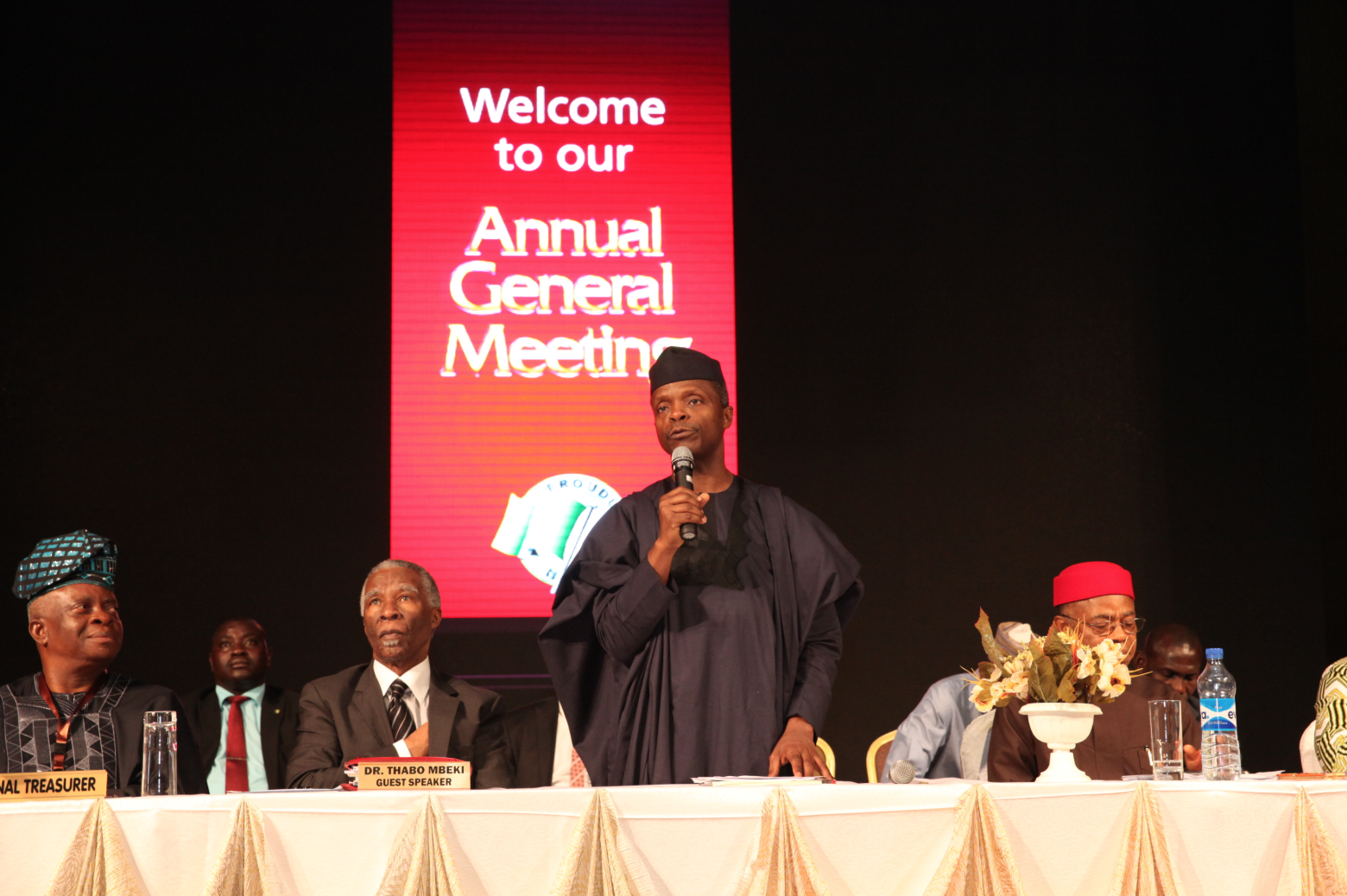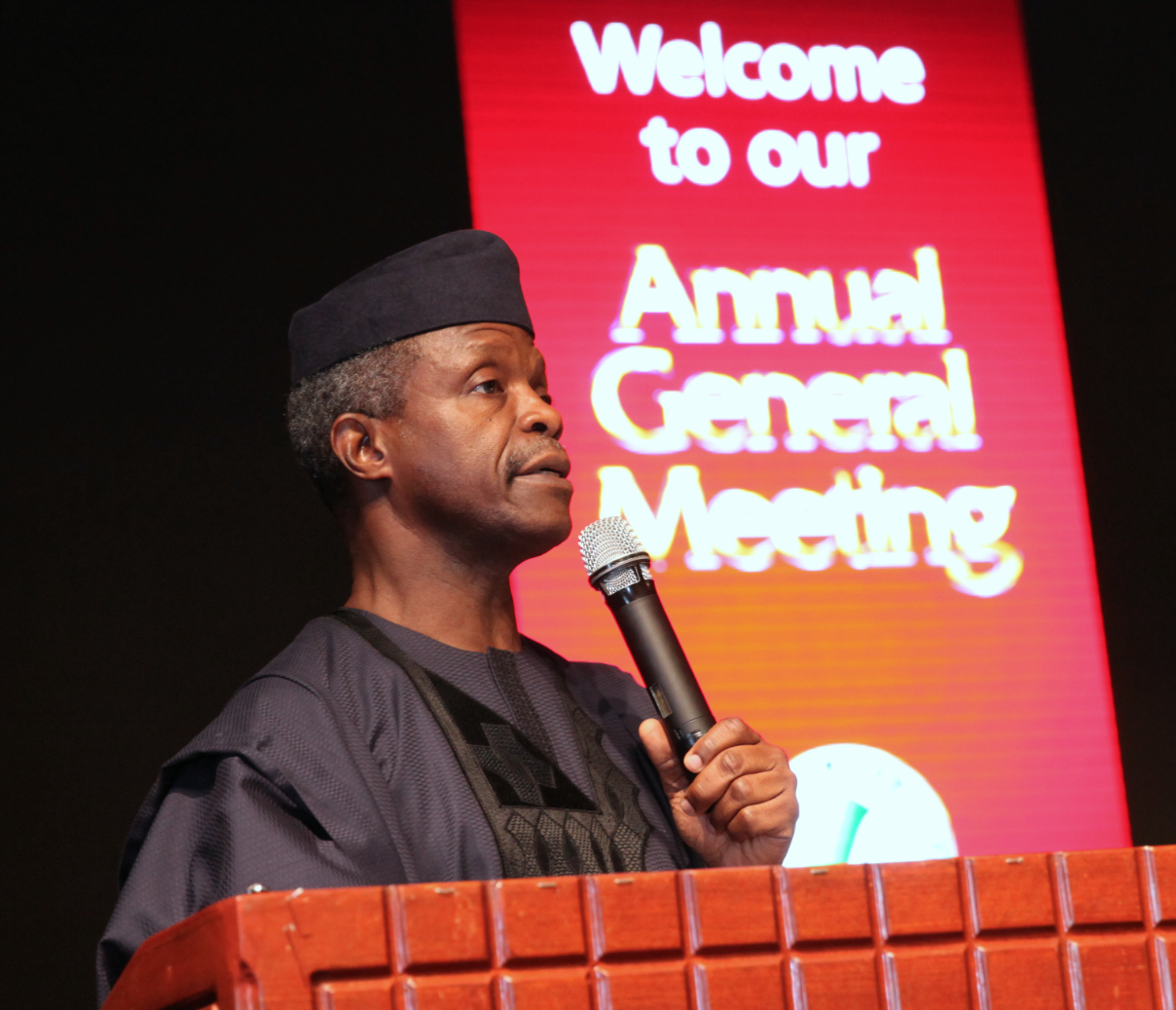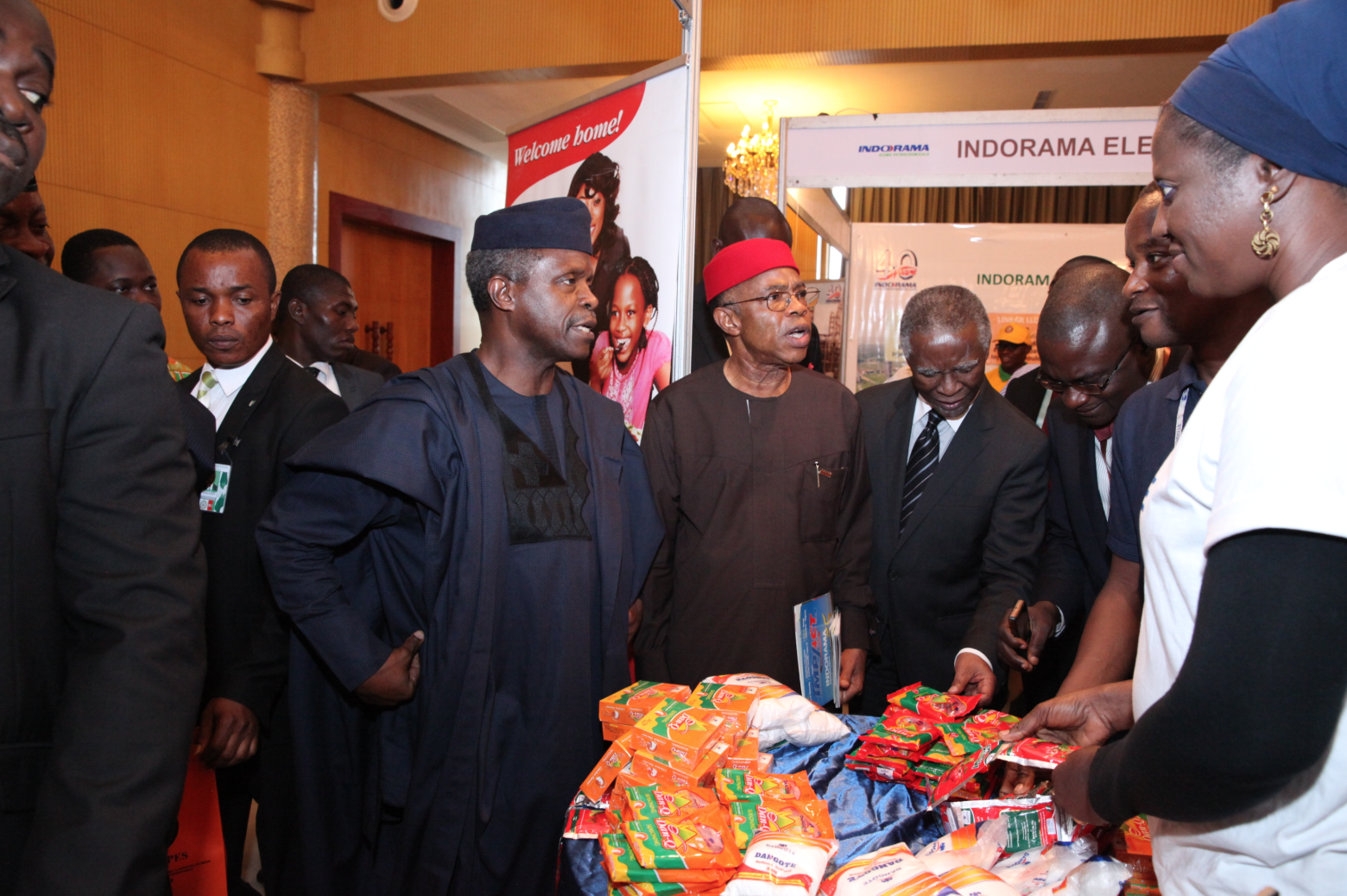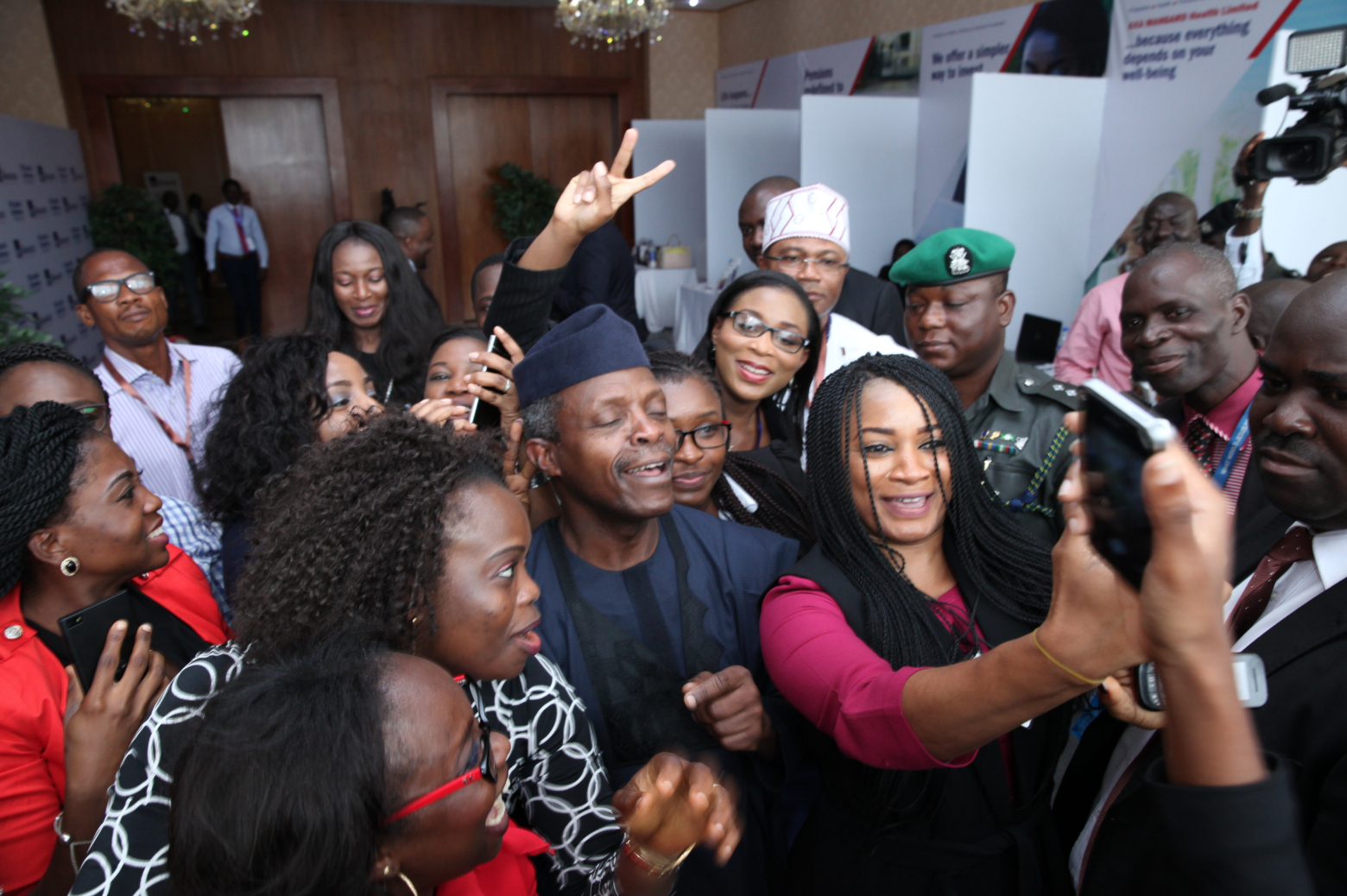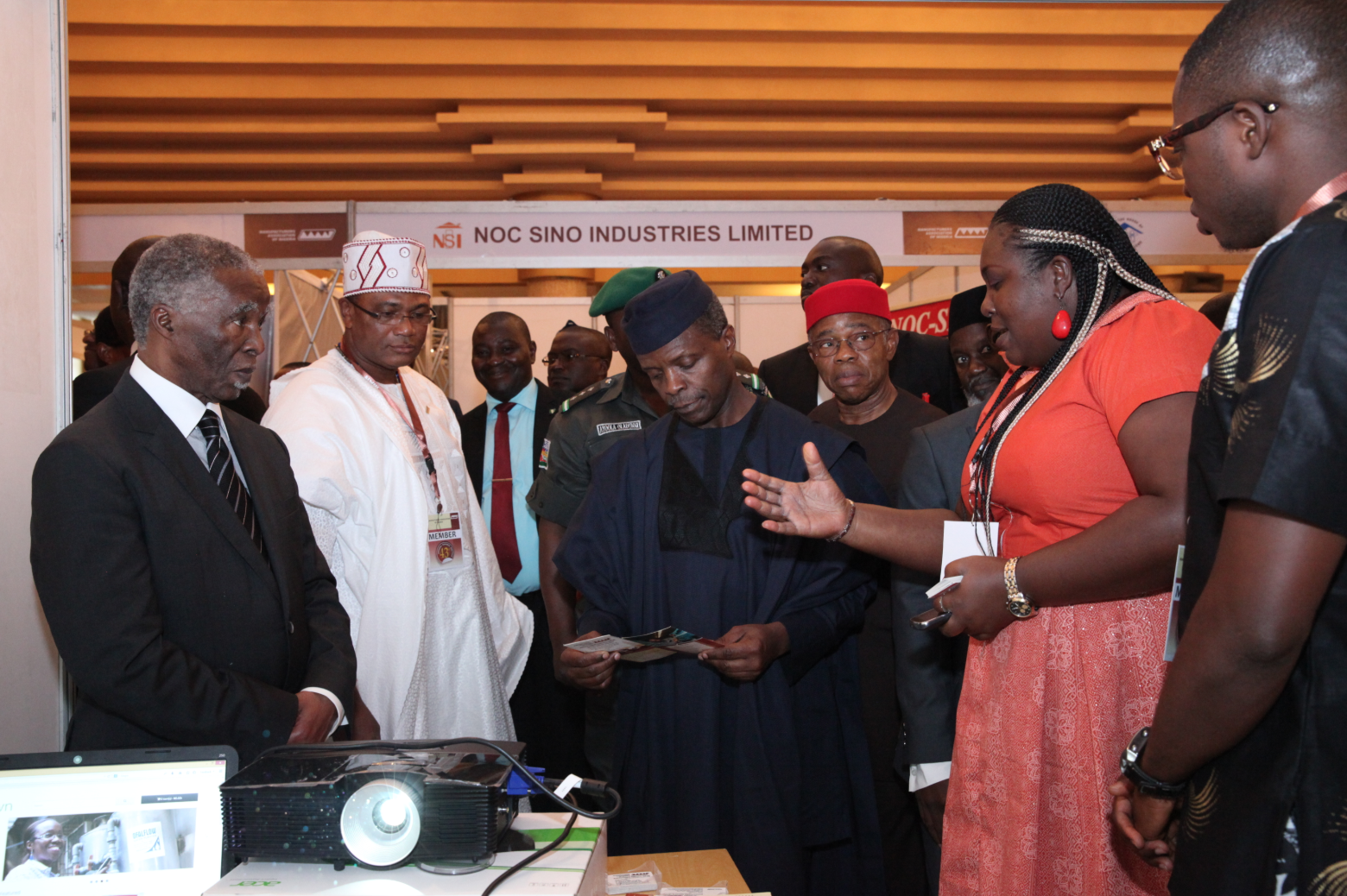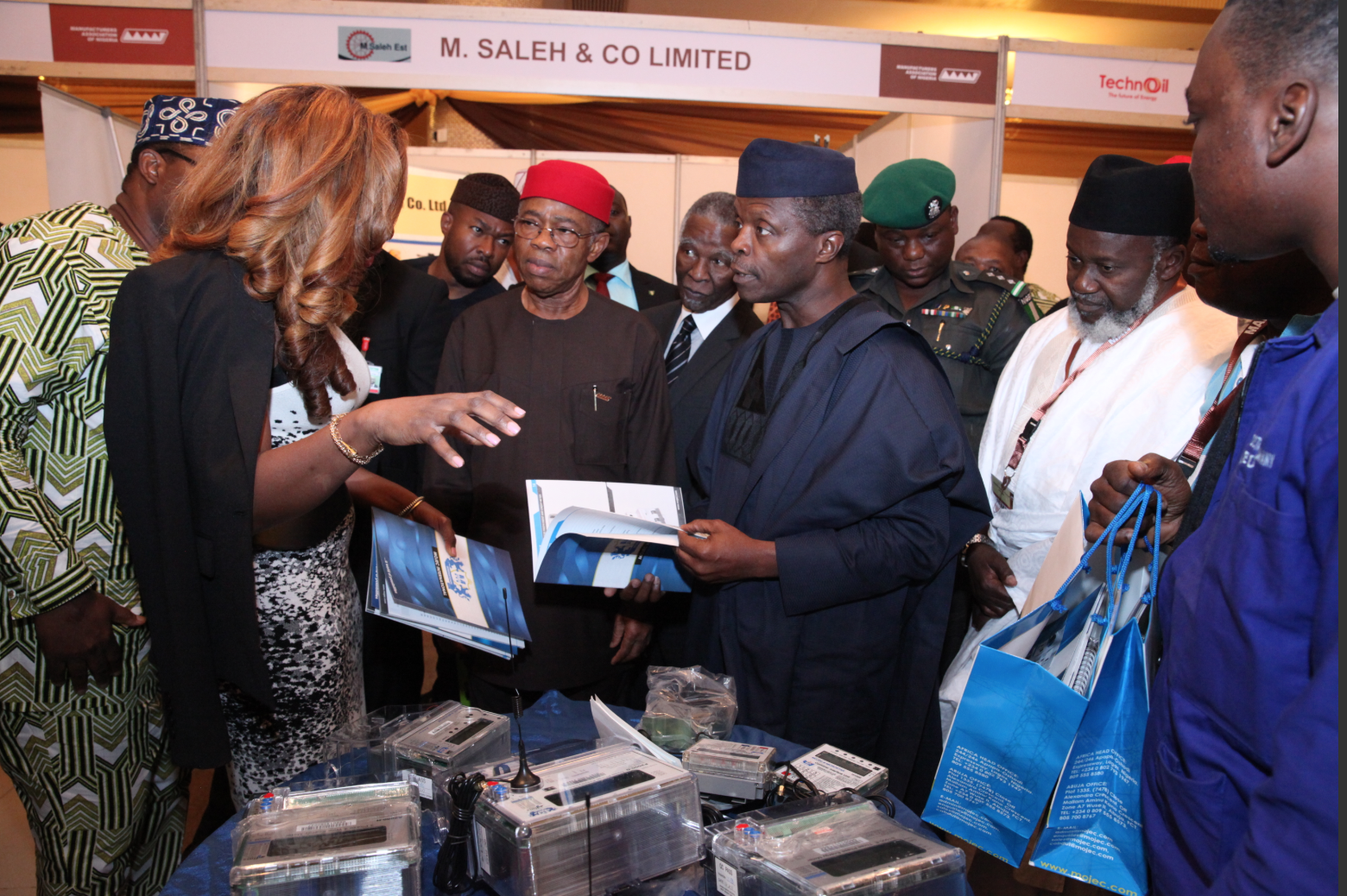The Manufacturers’ Association Of Nigeria Conference
Manufacturing: Crucial Pillar Of Our Economic Future
REMARKS BY HIS EXCELLENCY VICE PRESIDENT, PROF. YEMI OSINBAJO S.A.N, AT THE MANUFACTURERS ASSOCIATION OF NIGERIA CONFERENCE ON WEDNESDAY 7 OCTOBER 2015.
PROTOCOL
Let me very quickly say that the president himself would have wished to be here and as a matter of fact, up until last week, he informed that he will be here, this invitation had come at some time in August. For him, the manufacturing sector is extremely important and he really that he should be here. Of course, the presence of Dr Mbeki is also an incentive for him to be here but unfortunately, he was unable to come, as you can imagine, there are several issues that need to be dealt with in the next couple of days. He needs to be in Abuja, and I am here as his representative.
But fully as you know, I’m a lawyer, I’m here with the limited delegation, so you cannot hold me to very much, I will commit to very little, and if you want to hear more, then you must invite the president again the next time. But having said so, I’m sure that we will make the interaction be able to expand a little more on some of the issues that I’m sure concerns you greatly. But let me again welcome Dr Mbeki to Nigeria and of course here, it is very kind you sir to come, to attend this very important gathering and of course your track record in South Africa speaks for itself and there is a lot of examples to be drawn from the bold and courageous ways you tackled economic issues in South Africa during your tenure.
Many of the issues are some of what we have to deal with, maybe a bit more pronounced, because of the infrastructural challenges that we have, but I was to welcome you again sir and thank you very much for the comments that you’ve made and remarks you’ve made. Several of them we will certainly use as guides in taking out some of our own.
Let me say very quickly, there is no question at all that manufacturing is a crucial pillar in our economic future. As a matter of fact, when you speak of the future of manufacturing in Nigeria, you are actually speaking of the future of Nigeria economically. I think that being the largest economy in Africa in itself, places upon us certain responsibilities as Dr. Mbeki had pointed out, and one of those very important responsibilities is in the kind of manufacturing base that we ought to make, so that we can better negotiate as a key player in the region with other regional blocks. I think that our acquisition, a strong Nigerian acquisition in the manufacturing sector, places Africa in a better negotiating position. Some of the comment that Dr Mbeki has made about the ACP, EU Negotiations and other similar trade negotiations, almost invariably point to the fact that we are always negotiation a very weak positions and a lot that weakness has to do with the fact that the largest economy has a long way to go in stepping up to the plate. And if we’re able to do so, it certainly would mean that we will be in a much better negotiating position.
I want to say that for us, the government of Nigeria; manufacturing is key to several or parts of the objective in government, the creation of jobs being the central issue. Of course, one of the key promises that the government made during the campaigns, was that we will create jobs. And of course, an important element of that is the manufacturing sector. There is no way of doing that without diversification of our economy, diversification of our economy central to that is the entire agricultural value chain. How does the agricultural value chain work without manufactures, mining as well? And of course, the oil and gas value chain as well.
Every one of us agrees that the missing link in that core value chain in manufacturing. The import of oil and gas is certainly insufficient without going down the manufacturing value chain, and the same as agriculture. And we think that it’s important of course, in every respect that some attention should be paid to all of these areas.
I think the duty of government really, is to create an enabling environment for all of these things to happen. And I’m just going to talk very briefly on some of the issues in creating that enabling environment. Some of them I should not tell, and of course, even in the short term, they present difficulties. For example; the issue of foreign exchange and the foreign exchange restrictions that we have at the moment and the exchange control restrictions that we have. I think the point needs to be made that the exchange control restrictions are, of course, a reaction to the problems associated in the downturns in oil revenues from 100 to 115, only three years ago, to about 45 dollars a barrel a day. So, there is obviously a problem with earning in foreign exchange. And for a country that is largely import dependent, there is no question at all that when you have that kind of downturn, there must be some exchange controls. The question, of course, is how long can those controls last and what do we do in that short-term, what are the critical engagements that we need to have in order that the manufacturing sector does not suffer too much, in that short-term period.
There are those who say that there should be no exchange control at all, in my view that certainly is not an option, because we need, of course, a foreign exchange reserves, even to have any kind of stability in our currency at all. In any event, it is the foreign exchange reserve that we use for practically everything else.
I think that one of the critical issues that we have to deal with is the negotiations with the manufacturing sector to look at how those exchange controls can be eased in as short to medium term, to enable some of the banned items, perhaps to look at them again as we go forward, so that we can see whether or not (and I said banned items, that’s not entirely correct, items that are not eligible for foreign exchange cover). I think that those negotiations are possible, that those discussions are possible and I believe that especially in the medium to long-term, we will have to look at how to ease those restrictions so that things can be made a bit easier.
But it is also important to exercise that there is no way of improving local industry without some restrictions, there is no way of ensuring for instance,[ that oil palm production goes up. There is no reason at all for us to be importing palm oil at this point, but here we are importing it, and we may not have a choice because of where we are. But the only way to improve oil palm production is to restrict the importation of oil palm one way or the other. Sometimes, it is easy to argue that let us protect local industries, let’s protect manufacturing and that is an important issue. We have to protect the manufacturing sector, but protecting the manufacturing sector also means restricting importation.
There are many who argue in our company here today, that those kind of restrictions are not very productive. I think that creating that balance is the difficult situation that the government often finds itself but one thing that I want to emphasize is that extreme control restrictions are not meant to be permanent, they are not meant to be long-term policy, and I’m sure that as things improve, we will take a second look at those restrictions and in our discussions with the Central Bank, that certainly is their position. I want to talk also very quickly, as I said the business of government is to create the enabling environment.
Power is, of course, crucial and as the president said in his inaugural address, to which President Mbeki referred. The question of power is one that is absolutely crucial to manufacturing and practically everything else and we shouldn’t be rejoicing at 4000 Megawatts of power. But the problems are historical and several of those problems will need tackling head-on, on a day by day basis. One aspect of the problem that I want to speak about because this also affects manufacturing, is the whole idea of the tariffs. Of course, the President of MAN just said that we have one of the most expensive electricity in the world. Now, the truth of the matter is that at this point, if we wanted to have a cost-effective tariff because the only way to service that core value chain, the only way to ensure that we are paying and compensating the value chain from generation down to distribution is a cost-effective tariff. You cannot have that cost-effective tariff without some pay. At the moment, (when you compare) how much it costs to produce power, and the amount of power that is generated, the losses on account of distribution are significant. In some cases, you have up to 40% losses in distribution, and of course, it is the DisCos that have to take that burden.
The GenCos (generating companies) are producing power but they expect to be paid for all the power that they produce, now if 40% of this is lost, it means the DisCos cannot collect 40%, but they have to pay for it somehow. So the government has to come in and play some kind of role in order to ensure that the whole value chain is paid for. But the most important thing is that the cost of power is reflective of costs that have to be borrowed at every stage of the value chain and today the cost of power if it’s going to be reflective in any way, is simply what it is. It will be very difficult indeed, except if we are going introduce yet another subsidy and by the way, a fair amount of that goes on in a way that government supports the GenCos and the DisCos.
But I think that we must be ready to accept that for a while until things stabilize somewhat, tariffs cannot remain at the levels at which they are today, they cannot remain at that level, and that just simply is the truth of the matter.
It certainly means that there may be higher costs, but I don’t think that an option of not having power is really what we want. The real issue, of course, is that at the end of the day, some of the cost goes to the consumer, but a cost reflective tariff is an absolute necessity, otherwise, privatization and all of that simply doesn’t make sense
And we may not be able to do very much by way of producing constant power. But just to mention few of the issues today, of course many who are following this, I’m sure that most manufacturers are following; generation is the key to stabilize somewhat, and we expect that going into next year, we should be able to come to about 5000 Megawatts of power, especially the first to mid next year. Now the most important issue, of course, is not so much generation, because we have installed capacity from last year already, close to 12,000 Megawatts of power.
The more important issue for us now is how much of that power can be evacuated through our transmission grid, and a lot of that power at the moment, we can do just about 5000 megawatts of power, but there’s a lot of work going on in transmission, a lot of work, and I think that again by mid next year, we should nearly at least have improved transmission capacity by 40%, which will mean that we can do a bit more in terms of evacuation of power.
And quite a few of the projects we are looking at, in fact, we just completed a survey on some of the transmission assets, some of the workload and transmission assets two days ago, and we expect that some of that work once it’s completed, we can do a lot more in terms of transmission, evacuation of power as we improve generation. So that is as far as power goes, but certainly, power as you know, is a matter that we are taking more seriously on a day by day basis, and I’m sure that if you look at some of the figures we post figures regularly (we even have a website now where we post the actual megawatts of power generated on a daily basis), just so that those who are interested can follow and see what exactly is going on. A few days ago, I’m sure some us know that there was a sabotage in the Egbin plant, and that led to the drop of a thousand megawatts of power. But we are back and we expect that very shortly, we should be back in full production.
I also want to talk a bit about some of the partnerships agreements, the common external tariffs and some of these problems that we have and some of our engagement, especially with the WTO (World Trade Organization). And a point very well made by Dr Mbeki, that is that as far as partnership governments go, especially the ACP, EU arrangements terms and all of those types of agreements, it’s important for us to pay close attention to all that is going on around us, and I think sometimes, there is a tendency to be careless about the actual terms of these agreements. One of the major pledges that we make as a government, is that we will not enter into any agreement that jeopardizes the long-term interest of Nigerian manufacturers. Of course, for that matter, the Nigerian economy as a whole, I think that we are at a point in our development where we need to be careful about, especially protective certain industries; textiles just as an example. If you look at what is going on, some of that is related to smuggling and some of the issues around smuggling.
We think that it is important to protect our manufacturers in that way. For example, the changes that have been made in Customs today, are changes that are meant to show the seriousness of government and our controlling borders, and that ensuring that we do not allow a situation where local industries suffer on account of government failure to do something serious about smuggling. We are also looking at piracy, enforcement of piracy, regulations on all intellectual property, protection regulations as well, we are looking at how to be more effective in enforcing all the anti-piracy rules and anti-piracy laws.
With respect to some of what we see today, I am sure that many of us agree that there is a new search, as somebody said earlier today, the “low-cost producer.” I mean China and Asia who are able to get our comfortable attention because they are able to produce good products at relatively low costs. Of course, they have become fairly high-cost producers today, as their middle class expanded, so it’s for us, and I think that the time for Africa to become that next low-cost producer, the way that China and Asia were able to do so.
Now the challenges of becoming that low-cost producer are many, and of course some of them, we’ll mention some of them; power, education, especially, of middle-level technical manpower. We need to educate our technicians, we need to have stronger vocational education and all of that. But I want to mention also that there is a need for a different work ethic. Some of what is eminent in the way that the Asians were able to become so prominent in manufacturing is work ethic. It’s that ethic that just insists on seriousness and concentration and hard work, doing the work, no matter how routine it is and ensuring that quality is delivered.
I think that we need to imbibe that work ethic, because, at the end of the day, it comes down to how productive we are, and aside from all of the infrastructural difficulties that we have, there is a major work ethic problem and I think we have to deal with that if we are going to be able to take a place in the world as that next low-cost producer.
The policy I have said of our government is to work as hard as possible in ensuring that we have an environment that works for the manufacturer and that works for business generally. And that means doing a few things that are important. One of those things is the ease of trade; some will describe it as the trade facilitation challenge, how do we ensure that it’s easier to do business here in Nigeria?
How do we ensure that for the manufacturer, that for the exporter, even for the importer, it is simply easier to do business here than many would say today? That it is easier to export your material through the Benin Republic than here, because of some of the problems that we have in the whole trade facilitation area. I think we need to deal with those issues, we can’t really talk about a serious manufacturing especially where we are even thinking of exports without cleaning up in that particular area. So these are some of the areas that we think need attention, cleaning up the business environment generally, through investment approvals, and making sure that it’s easier to do business here than in all of our competing economies around us.
That is a challenge for the government, and we are addressing these issues very seriously, and we think that in the next few months, going into the next year, we should see some appreciable changes in the way that things are done. Of course, we need to clean up even the way that business is done with government and that comes to all of the questions around transparency, accountability, the anti-corruption policy and all of that. I’m sure that many know already that we are determined to ensure the country, the public service and all of the areas where public service interfaces with the private sector, are cleaned up. That transactions are transparent and that we are able to ensure that ransacking for ransacking sake and corruption is controlled and eventually eradicated. And the policy as I’ve said is to vigorously defend the manufacturing sector and also consistency in policies to ensure that we are able to be as consistent as possible and to offer protection where necessary.
I just said to the President of Manufacturers Association, that we intend to engage with the Manufacturing Association as frequently as possible because we think that there is no doubt whatsoever, that your plans and your aspirations are the same as the plans and aspirations of the government. If manufacturing does well, everybody does well, there are jobs and of course, the government itself looks good; and every government wants to look good. So I think that there is no question at all that interests are aligned and we will certainly be engaging with you as frequently as possible.
Thank you for listening.


